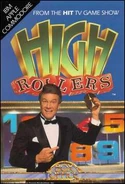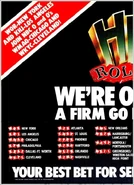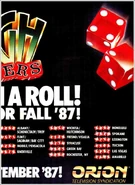| Aired | |
| Pilot, October 21-22, 1986 Syndicated, September 14, 1987-May 27, 1988 | |
| Run time | |
| 30 Minutes | |
| Host | |
| Wink Martindale | |
| Announcer | |
| Dean Goss | |
| Origination | |
| Studio 41, CBS Television City, Los Angeles, California | |
This is chronicling the 1987 version of High Rollers.
Game Format[]
Main Game[]
Two contestants competed (almost always one male and one female), one of whom was a returning champion (or designate, if a previous champion had just retired). The object of the game was to remove numbers off a game board containing the digits 1 through 9 by rolling an oversized pair of dice.
In order to determine who gained control of the dice, the host asked a toss-up question with either multiple-choice answers, true/false answers, or "Yes" or "No" answers; whoever buzzed in with the correct answer won control; an incorrect answer gave the opponent control. The player in control could do one of two things:
- Roll the dice, an option usually taken only early in a game.
- Pass them, forcing his or her opponent to roll. This was by far the most common decision, especially as a game progressed, with fewer good rolls on the board (and since a bad roll automatically lost the game). However, if the odds of making a bad roll were low, such as a 3 or an 11, the player who won control of the dice could take the gamble and roll.
Players removed numbers from the board based on the value of the roll of the dice (either all by itself or in combinations). For example, if a 10 was rolled, the player could remove any of these combinations: 1-9, 2-8, 3-7, 4-6, 1-2-7, 1-3-6, 1-4-5, 2-3-5 or 1-2-3-4, which were all combinations that added up to 10.
Contestants who rolled doubles (e.g., 2-2, 3-3, 4-4, etc.) earned an "Insurance Marker," which could be turned in for a free roll if they hit a bad number. However, if the doubles roll itself was a bad roll, the insurance marker was translated simply into another roll, which meant that a roll of 2 (aka "Snake Eyes" 1-1) and a roll of 12 (aka "Boxcars" 6-6) were the only safe rolls whether the number itself was on the board or not.
Play continued until:
- One player made a bad roll, meaning no combination of digits currently on the board could match that roll of the dice.
- One player took the last remaining digit(s) off the board (the rarer outcome).
Each game featured a different prize package in each column; in some games, one of the columns contained the right to play one of several "mini-games".
- Around The World – Each number on a die corresponded to one of five available trips; rolling a 6 won all five trips (i.e. "a trip around the world") and $5,000 in spending money. Later in the run, the $5,000 spending money was dropped.
- Cookie Jar – The contestant would roll a die and whatever number the contestant rolled was worth $100 times the value of the die. However, rolling a six earned the contestant $1,500. On the Halloween episode, the game was called Trick or Treat.
- Diamond Mine – Each number from 1 to 6 was worth some type of jewelry; rolling the corresponding number won that piece of jewelry.
- Dice Derby – This game mimicked a horse race; one horse was designated with even numbers (2, 4 and 6); the other odd numbers (1, 3 and 5). The contestant rolled the die and the appropriate horse moved one space depending on the outcome. The first horse to move four spaces on the track would win the race and a prize for the contestant. If the even horse won, the grand prize was a new car (or sometimes a trip, $10,000, or another large prize). If the odd horse won, the contestant received a small prize, such as a moderately-priced trip or $1,000.
- Driver's Test – The player controlled a game piece on a 12-space game board, arranged in a 4×4 ring of spaces. (S)he had four rolls of a die to make the piece land exactly on the "CAR" space (which was eight spaces away from the starting position). The piece always moved toward the "CAR" space; if a roll caused it to overshoot the target, the next roll would have the piece reversing direction. Failure to land on CAR won the cash amount ($100, $500, $1,000, or $2,500) he/she did land on.
- Duel of the Dice – This was only played in a pitch in the pilot. The contestant faced off against a monkey named "High Rollers". The contestant rolled the dice first. The number that came up was the number that the monkey had to beat. Then the monkey rolled the golden dice, and if the contestant had the higher number, he/she won a trip and $1,000 in traveler's checks.
- Full House – Each number on a die corresponded to a different room of a house. The player rolled the die and won the room corresponding to that number. However, if a player rolled a six, the player won all five rooms in the house (i.e. the "full house").
- Home Away From Home – Each number on a die was worth a recreational vehicle of some type; rolling the corresponding number won that RV. A variant on this game was called High Seas, where the prize was a boat or other type of watercraft.
- It Takes Two – A different prize was assigned to each number on the die. The contestant continued to roll the die until he/she repeated a number, winning the prize corresponding to that number. Frequently, the prize for rolling a six twice was known as the "Kitchen Sink", meaning the contestant won all of the other prizes; on other occasions the sixth space was known as "Your Choice", meaning rolling that number twice meant that the contestant could choose one of the five prizes available. There was also a version for the Rich & Famous.
- Love Letters – The contestant rolled a die six times to reveal letters in a six-letter word. After the six rolls, the contestant had five seconds to either answer (or at least think of an answer). Solving the word won a new car. Not solving the word won $100 a letter.
- Lucky Numbers – The contestant chose a number between 1 and 6, and then rolled the die. A correct hunch won the player a new car. This game was never played.
- Map Game – An earlier version of "Around The World", played on the pilot and the series premiere. It was played identically to Around The World, except in this game, a 6 did not win all five trips (but rather a sixth, more expensive trip). A variant on this game was called the Map & Money Game, because it supposedly had money involved; however, it was never played. Two other variants were called Island Hoppers, because the possible trips were island vacations, and For Lovers Only, because the possible trips were romantic vacations.
- Millionaire Game – Each number from 1 to 6 was worth a certain number of California Lottery tickets; whatever number was rolled, the player won that number of tickets.
- Paris or Bust – The contestant rolled a die and if they rolled 2, 4, or 6, they won a first-class trip to Paris. If they rolled a 1, 3, or 5, they won nothing.
- Rabbit Test – This game, which was played sparingly, took place center stage. The models wore fur coats. One coat was a fake, while the other was real rabbit fur. If the contestant could "feel out" the real fur, they won it. Sometimes, the rabbit was the secondary prize with the top prize being a mink coat, furnished by Dicker & Dicker of Beverly Hills.
- Screen Play – Each number from 1 to 6 was worth a television set of some type; rolling the corresponding number won that TV.
- Shop Till You Drop – Played similarily to Cookie Jar, The contestant would roll a die and whatever number the contestant rolled won a shopping spree worth $1,000 times the value of the die. However, rolling a six earned the contestant a $10,000 shopping spree.
- Smiling Wink's Car Lot – In this game a each number on a die represented a new car — except number 6, which represented a "Clunker" (junk car), but at least the car was operational. The player rolled the die and whatever number came up, the player won the corresponding car.
- Wild Wheels – The player would roll a die; if they rolled 1, 3 or 5 the player won a new car. If they rolled a 2 or 4, the player won a thousand gallons of gas. However, if they rolled a 6, the player won two cars.
- Wink's Garage Sale – Six prizes, including a worthless gag gift, were available. Rolling a 6 won the junk prize; the others were the usual game show prizes.
The winner of the game kept any and all prizes in his/her bank; in the event the bank was empty, he/she won a "house minimum" of $100. The first player to win two games won the match.
The Big Numbers[]
In the bonus game, called the "Big Numbers", the champion attempted to knock off numbers on a new, bigger gameboard. Insurance markers were still awarded for doubles. If a contestant failed to eliminate all nine numbers, he/she received $100 for each digit that was eliminated from the board, but if he/she could, the contestant won $10,000. Also, the winning contestant rolled a pair of "golden dice" when playing the Big Numbers.
Players could stay until they lost or won five matches. Doing so was originally worth a new car, but by the time a player finally retired undefeated, this bonus had been dropped, thus leading to more cars being offered in some mini-games, and often during the main game.
| This page uses Creative Commons Licensed content from Wikipedia (view authors). |
Stations[]
Stations that aired this included:
- New York - WOR (now WWOR)
- Los Angeles - KHJ (now KCAL)
- Chicago - WMAQ
- Philadelphia - KYW
- San Francisco - KOFY
- Boston - WNEV (now WHDH)
- Dallas/Fort Worth - KXAS
- Denver - KCNC
- Phoenix - KPNX
- Minneapolis - KSTP
- Miami - WTVJ
- Orlando - WESH
- San Diego - KGTV
- Cincinnati - WCPO
- Seattle - KCPQ
- St. Louis - KMOV
- Cleveland - WKYC
- Pittsburgh - WTAE
- Indianapolis - WISH
- Baltimore - WBAL
- Kansas City - KCTV
- Milwaukee - WTMJ
- Norfolk - WAVY
- Rochester, NY - WOKR (now WHAM)
- Madison - WKOW
- Honolulu - KHON
- Louisville - WLKY
- Albany, NY - WRGB
- Tuscon - KVOA
- Mobile, AL - WEAR
- Detroit - WDIV
- Grand Rapids - WWMT
- Albuquerque - KOAT
- Harrisburg - WHTM
- Hartford - WTNH
- New Orleans - WWL
- Salt Lake City - KSL
- Montgomery, AL - WHOA
- Amarillo - KVII
- Portland, ME - WCSH
- Tampa - WXFL (now WFLA)
- Portland - KGW
- San Antonio - KENS
- Wilkes-Barre - WNEP
- West Palm Beach - WPEC
- Green Bay - WBAY
- Flint - WEYI
- Fresno - KFSN
- Wichita - KWCH
- Syracuse - WSTM
- Atlanta - WSB
- Las Vegas - KVBC (now KSNV)
- Bangor - WABI
- Rockford - WIFR
- Nashville - WSMV
- Greensboro - WXII
- Knoxville - WBIR
- Spokane - KREM
- Lexington - WTVQ
- Charleston, WV - WSAZ
- Quad Cities - WQAD
- Yakima, WA - KIMA
- Kalispell/Missoula - KCFW/KECI
- Elmira, NY - WETM
- Boise - KIVI
- Memphis - WREG
Merchandise[]
Board Game[]
Parker Brothers (1988)
Computer Game[]
Box Office (1987)
Photos[]
Logo[]
Trade Ads[]
Trivia[]
A contestant named Darlene Hubert became this version's biggest winner, winning all five of her matches, and retiring with a total of $49,154.
Episode Status[]
USA network reran the series from 9/19/88-9/13/91, and MGM should have the run of this series in their vaults.
See Also[]
High Rollers
High Rollers (1978)
Lucky Numbers
High Rollers/International






























